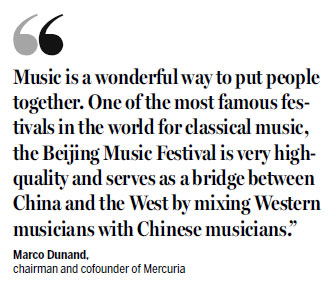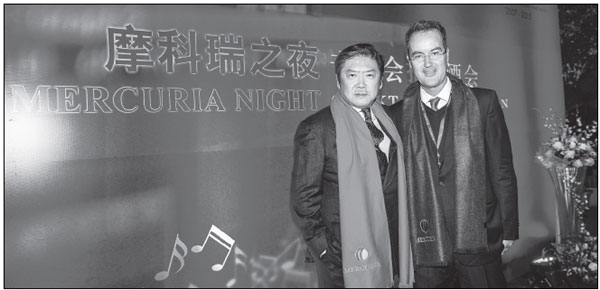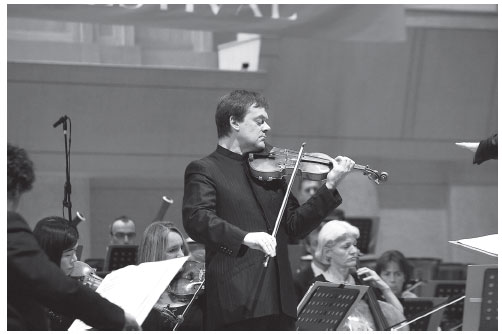Mercuria views music as a bridge with China
When Jukka-Pekka Saraste finished conducting the Johannes Brahms' Symphony No 4 on Oct 18 at the Forbidden City Concert Hall, waves of thunderous applause burst from the audience.
The symphony was performed by the WDR Symphony Orchestra Cologne and featured lead violinist Frank Peter Zimmermann. Sponsored by the Mercuria Energy Group, it was the fourth concert of a Brahms composition during the ongoing Beijing Music Festival.
This year's festival offers 18 performances ranging from symphony concerts to solo performances, operas, master classes and salons during its 17-day run that started on Oct 8.
Mercuria, a Swiss energy and commodity leading trading company, has been a sponsor of the annual music gala for the past eight years.
"Music is a wonderful way to put people together," said Marco Dunand, chairman and cofounder of Mercuria. "One of the most famous festivals in the world for classical music, the Beijing Music Festival is very high-quality and serves as a bridge between China and the West by mixing Western musicians with Chinese musicians."
Founded in 2004, the company is not only active in promoting Western classical music in China, but also in introducing new business to the country by collaborating with local companies.
Last month, Mercuria signed an agreement with China Materials Storage and Transportation Development to sell the Chinese company a 51-percent stake in Henry Bath& Son, a 220-year-old warehouse firm. CMSTD will pay $60 million for the holding.
"Henry Bath is one of the world's oldest companies where you can store metal. It has a lot of experience in logistics and storage in the field, and also in helping customers who store metal to borrow money from banks," Dunand said.
Most of the storage business of Henry Bath is in Asia, Europe and the United States.
"CMSTD is one of the biggest logistic companies in China. With this new partner, we are hoping to bring our international experience to China and learn some local experience from CMSTD. Also, we hope to create together one of the best storage locations for metal and one of the top brands for storing metal in China and internationally," Dunand said.
The deal is waiting on approval from the Chinese government. When it is finished, Mercuria will become the first foreign company in China working with a local partner in metal storage.
As the son of a classical music conductor, Dunand seems to have learned from his father's experience of facilitating people to work together harmoniously.
Dunand, the "conductor of Mercuria", has successfully made the company one of the largest privately-owned businesses of its type in the world.
With only 10 staff when it began, it now has 35 offices and more than 1,000 employees worldwide, and operates in over 50 countries.
Last year's $800 million takeover of JPMorgan Chase& Co's physical commodity business helped Mercuria achieve a globally more balanced business in North America, Europe and Asia.
The company's total turnover reached $106 billion last year,
Mercuria has considered China an important market from the very beginning.
"Out of six people who founded Mercuria 11 years ago, two people are Chinese, so we have a very strong Chinese DNA," Dunand said.
In China, Mercuria has a wide range of customers and has formed strong relationships with them. It is the largest importer of fuel oil in the country.
"China consumes a lot of energy, including diesel, gasoline and base metals like copper and aluminum. The price of energy changes every few hours and with our wide office network we are able to bring competitive prices to Chinese refiners, who are becoming more and more important in the world of energy," he said.
Dunand said the energy market will "change inside China" in the future and the way that Chinese consumers buy energy is going to be "involved in more open markets".
"There is a need for better knowledge of commodities, because the markets can move very fast. For instance, the price of electricity changes every hour in Europe and the US, but it has been more controlled in China. I think the market will open, so the experience will be different for Chinese consumers than today," he said.
Strengthening its cooperation with Chinese companies will be one of Mercuria's focuses in the next few years.
"We US, but it has been more controlled in China. I think the market will open, so the experience will be different for Chinese consumers than today," he said.
Strengthening its cooperation with Chinese companies will be one of Mercuria's focuses in the next few years.
"We will look to cooperate on a stronger basis with co-investments, either with investments in China or with Chinese companies investing abroad," Dunand said.
|
Marco Dunand (right), chairman and cofounder of Mercuria, with Yu Long, artistic director of Beijing Music Festival, at Mercuria Night during the Beijing Music Festival on Oct 18. Photos Provided To China Daily |
|
A symphony, sponsored by the Mercuria Energy Group, is performed by the WDR Symphony Orchestra Cologne and features lead violinist Frank Peter Zimmermann on Oct 18. |

(China Daily 10/23/2015 page17)




















